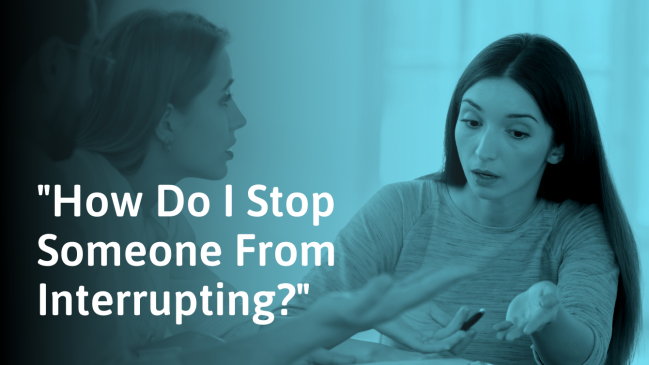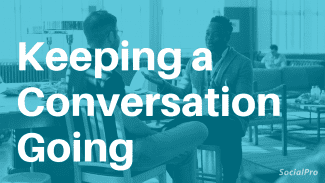Being interrupted can make you feel disrespected and belittled. You may wonder whether the other person really cares about what you have to say at all. Even if you understand that interrupting says more about the other person than it does about you, it can still be frustrating when you can’t get your point across.
You don’t need to be overbearing or dramatic to ensure that you are included in conversations. Here are some of the best ways to stop others from interrupting you.
1. Understand why people interrupt
When someone interrupts, especially if they do it a lot, it’s easy to assume that it’s because they don’t respect you. Understanding the psychology of interrupting can help you to respond to it.
Here are some of the reasons people interrupt:
- Some people interrupt more when they are excited about a conversation. They might be concerned about forgetting what they want to say, so they cut you off before you’ve finished making your point. This is especially common for people with ADHD.[1]
- They have a different communication style. There are two types of interruption: cooperative and intrusive overlap.[2] Intrusive overlap is where the other person disrupts your point. Cooperative overlap is when someone speaks over you to express agreement with what you’re saying or finishes your point as a sign that they are really engaged in the conversation. Some groups use a lot of cooperative overlap.[3] They might see a pause between speakers as a sign that you’re not on the same wavelength.
- They learned to interrupt. Some families interrupt a lot.[4] Children who are interrupted learn to interrupt others and continue this habit as adults.
- They are rude or arrogant. Some people believe that what they want to say is more important than other people’s opinions.[5]
- They don’t realize that you haven’t finished talking. Sometimes interruptions happen because the other person thinks that you have already finished speaking.[6] Understanding that they have made a mistake and that they might be feeling awkward about it can sometimes help you to ignore an interruption.
2. Respond to interruptions before you get angry
Being interrupted can put you on the back foot. Often, we don’t know how to respond, so we try to ignore it. If it keeps happening, you might get angrier and angrier.
Trying to deal with a difficult social situation is much harder when you’re angry,[7] so try to speak up before you get to this stage. Telling someone that they’re upsetting us can help to reduce stress,[8] and they might stop interrupting.
3. Have confident body language
Confident body language can make it less likely that someone will interrupt you.[9] This includes:
- Standing up straight or leaning slightly forward
- Keeping your head up
- Making eye contact
- Having your shoulders slightly back
- Smiling
Practice confident body language in the mirror or when walking around. This can help you to feel natural standing or moving in that way.
4. Speak clearly
People will be more likely to interrupt if they can’t hear what you’re saying clearly. When people can’t hear you well, they miss the subtle pauses and intonation changes that signal you’re done speaking. This means they can interrupt by mistake.
We have lots of useful tips to help you speak more clearly, but the key ones are:
- Practice speaking a little more loudly than feels comfortable
- Make sure you move your mouth when you’re speaking
- Direct your voice towards other people and don’t look down
- Speak slightly more slowly
5. Have an animated voice
An animated voice isn’t just about showing enthusiasm for your conversations. It also helps others to understand whether you’ve finished speaking or not. We have some in-depth guidance on how to avoid a monotone here.
6. Be concise
People are more likely to interrupt a rambling conversation. Try to plan what you’re going to say, make your point, and then make space for other people to speak.
People are also more likely to interrupt you if you try to make a lot of points at once. Often, they’ll want to say something about your first point and are worried that they’ll lose the opportunity. Avoid this by trying to make a single point at a time. You can always bring up other points afterward.
If you really want to make several points together, consider giving them numbers. You could say:
“I have three thoughts on this. Number one is that …”
This tells others that you’re not done after your first point, and lets them know roughly how long they will have to wait to speak. If you have a lot of information to share, tell them you’ll be happy to answer questions or clarify any misunderstandings when you’ve finished talking.
7. Try not to apologize for your comments
People are more likely to listen to you if you sound confident. “Softening” phrases, such as “If I can just ask…”, “I was wondering…“ or “This is just my opinion, but…“ can allow others to interrupt.
Instead, try being direct. Ask questions without any preamble. For example, practice saying “I think…“ to your co-workers without apologizing.
8. Show you’re trying to find the right words
It’s easy to be interrupted while you’re trying to find the right words. Ideally, you know what you want to say, but sometimes you need to take a moment to gather your thoughts.
Show the person you’re talking to that you’re taking a second to think by looking up a little and raising one hand slightly in front of your face. Taking a deep breath can send the same message.
Don’t use this too often. Clarifying a complicated idea is probably fine. Pausing to remember someone’s name (when this isn’t relevant) can be frustrating.
9. Make people interested in your point
You’re probably already trying to say interesting things, but it can help to signal why it’s interesting when you start speaking. Try to link your comment to what was said before, or give people a hook to understand why it’s relevant to them.
For example, if you want to tell a funny story, you can say:
“That reminds me of the time I found a snake in my speakers. Did I tell you about that?”
10. Practice what to say
It can be hard to think of a response immediately after being interrupted. You probably feel awkward or embarrassed, and so you let the moment pass. This is normal.
Try to plan what you might say to highlight an interruption and practice it at home. Saying it out loud can really help here. Hearing yourself say the words can make them feel more normal.
What to say to someone who keeps interrupting you
Think about what you will feel comfortable saying. Some guides suggest confrontational replies to someone who interrupts you, but that doesn’t help if you feel uncomfortable saying them.
Here are some examples from more to less confrontational:
- Please don’t interrupt me.
- Excuse me. I hadn’t finished speaking yet.
- Hang on a moment.
- Sorry, I’d just like to finish this thought.
- Just a sec…
11. Signal that you haven’t finished speaking
It’s not always necessary to say anything to stop an interruption. You can signal that you’re not ready to stop speaking with your body language, especially if they didn’t mean to interrupt.
To do this, continue speaking in the same way you were originally. Glance briefly over at the person who interrupted you to show that you’ve noticed and raise one hand to about face height. You want to keep your hand relaxed, show that you’re acknowledging their desire to speak, and also show that you’re not quite finished. Holding up two fingers and saying “two seconds” can also help.
Try to finish your point quickly. You can say, “You wanted to say something?” to show that you’re now happy to listen to their ideas.
12. Ask someone to stop interrupting
Many people don’t see anything wrong with interrupting others, and even get angry with you for bringing up their interrupting.
Not wanting to be interrupted isn’t rude. It’s a reasonable boundary. If a spouse or friend interrupts you a lot, try talking to them privately about it. Explain why it upsets you, how it feels and what you would like them to do differently. You could say:
“I’ve noticed that you interrupt me a lot when I’m speaking. When you do, I feel like you’re not interested in what I have to say. I’d really appreciate it if you could be more careful not to talk over me.”
If they become defensive, you could say:
“I appreciate you don’t mean it that way, but that is how it feels to me. Being interrupted stops me from being able to properly engage with conversations, so I really need you to work with me on this if we’re going to keep hanging out.”
13. Stop speaking
One way to deal with a chronic interrupter is to stop speaking as soon as they interrupt. Wait until they stop and restart your point from the beginning. Try not to listen to what they’re saying during the interruption. The aim is to act as if they haven’t spoken at all.
The aim is to teach them that interrupting doesn’t achieve anything. The things they say while interrupting don’t get addressed, and they don’t get more attention. This strategy can come across as passive-aggressive, so it’s best used sparingly.
You may have to do this several times in a row, at least the first few times. If they ask why you keep repeating yourself, you can say, “I hadn’t finished speaking. If you can allow me to finish my point, I won’t need to say it again.”
14. Continue speaking
Alternatively, you can try to ignore their interruption and continue speaking. This isn’t always ideal, as you may just end up talking over one another. It can help demonstrate your boundaries with arrogant interrupters.
If you are going to use this technique, make sure that you are speaking clearly and at a good volume. Try pairing it with the body language techniques we’ve already mentioned to show that you’re not ready to stop speaking.
Common questions
What does it mean when someone constantly interrupts you?
Chronic interrupters might be too enthusiastic, worried they’ll forget what to say, or have grown up in a family who interrupt a lot. Frequent interrupting might show arrogance, disrespect, or a lack of interest in listening.
Is talking over someone disrespectful?
Talking over someone else is usually disrespectful, even if you don’t mean to be. Interrupting focuses on what you want to say rather than listening. Some people and groups will finish each other’s sentences to show that they are engaged; this isn’t necessarily rude.













My narcissistic mother-in-law interrupts my conversations with other people by sticking her face between us. She wants to be acknowledged NOW. She’s very much a child in an adult’s body. I really hate this, and I think it encourages her to do it more. How do I make it stop?
I had a friend that would always interrupt and finally, I apologized, saying ‘I’m sorry I was talking when you were interrupting’.